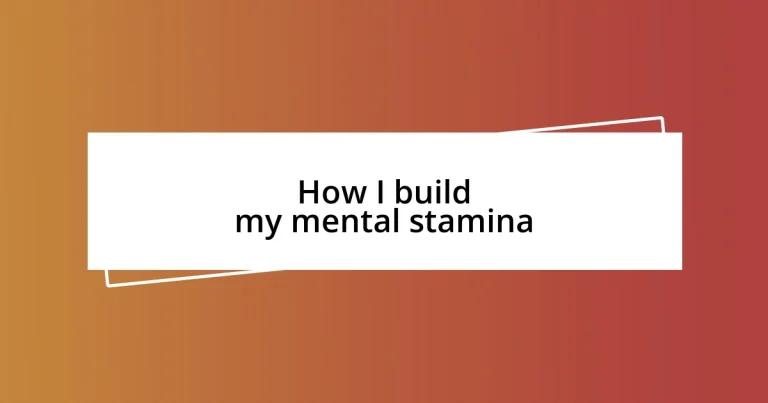Key takeaways:
- Mental stamina is essential for maintaining focus and resilience, comparable to physical endurance in sports.
- Techniques like the Pomodoro Technique and mindfulness meditation can significantly improve focus and productivity.
- Tracking progress through journaling and reflection helps recognize growth and develop resilience in the face of challenges.
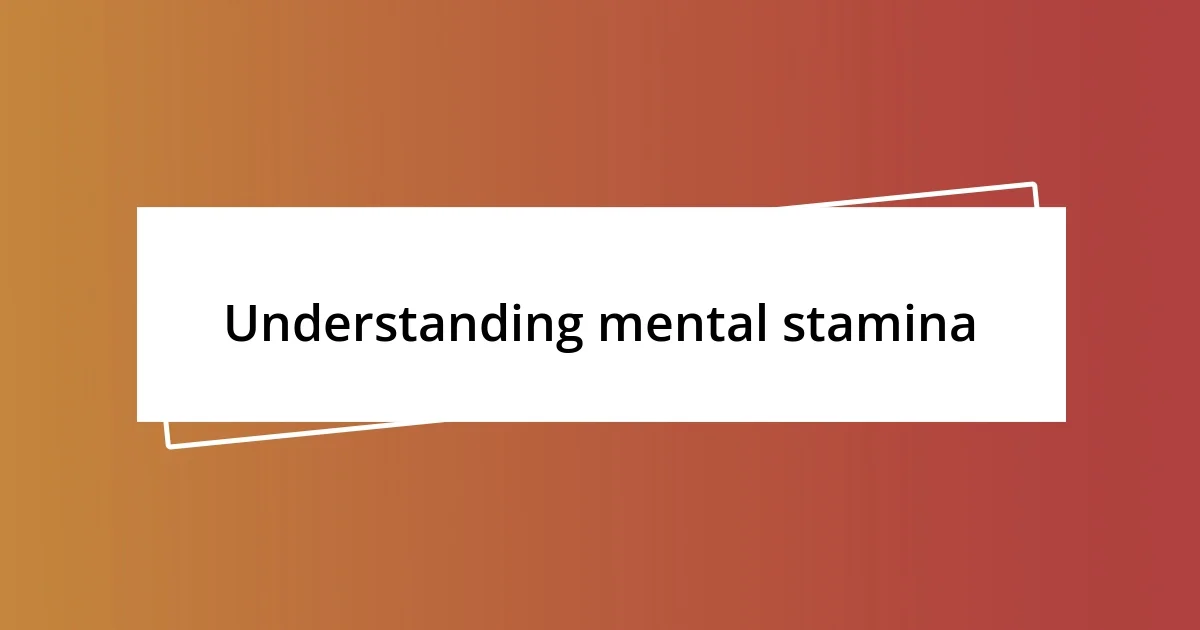
Understanding mental stamina
Mental stamina is the ability to maintain focus, resilience, and a positive attitude over prolonged periods, especially during challenging situations. I remember a time during a particularly grueling project at work; I felt mentally drained yet knew I needed to power through. It made me realize that our minds can be just as exhausted as our bodies, and understanding this was a turning point for me.
Have you ever found yourself struggling to concentrate while working on a task? That’s a clear sign of dwindling mental stamina. I often experience this when I’m juggling too many things at once. It’s essential to recognize these moments, as they highlight the need for mental breaks or a shift in strategy to replenish my focus and energy.
When I think about mental stamina, I picture it like physical endurance in sports. Just as athletes train their bodies to withstand rigorous exercise, we must cultivate our minds to handle stress and maintain clarity. I’ve learned that little practices, like mindfulness or even brief walks, can make a significant difference in how I respond to daily pressures; they serve as vital “workouts” for my mental stamina, preparing me for whatever comes next.
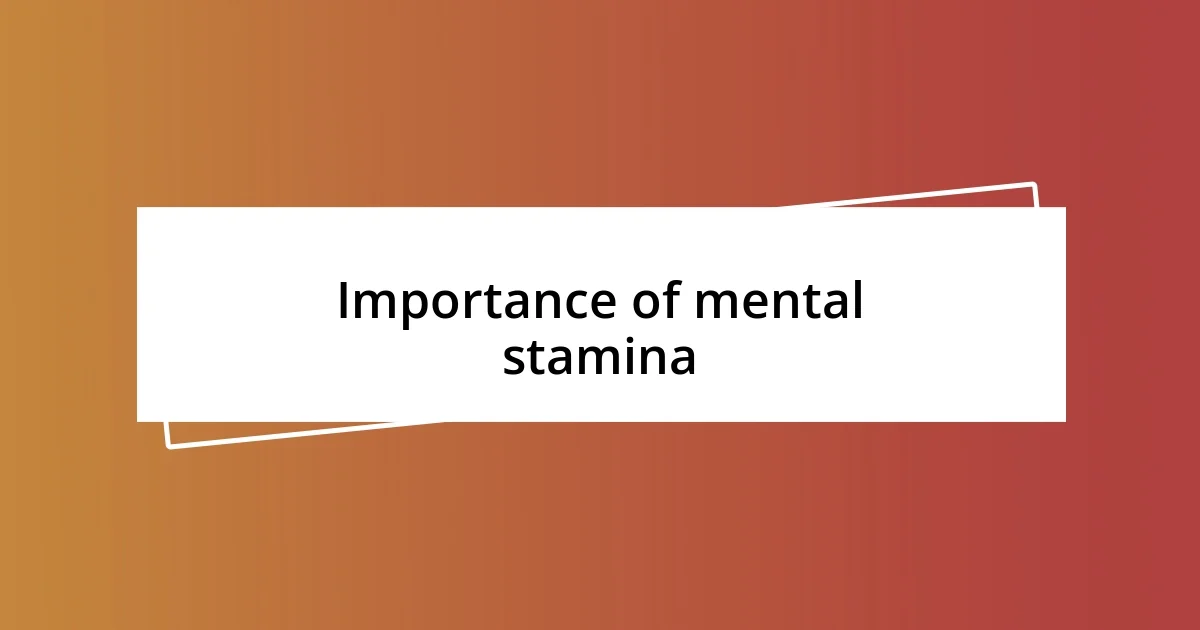
Importance of mental stamina
The importance of mental stamina cannot be overstated, especially in our fast-paced world. I’ve found that when my mental stamina is high, I’m not only more productive, but I also approach challenges with a sense of calm. During times when I’ve pushed through mental fatigue, like during a demanding event at work, the moments of clarity that emerged felt like glimpses into a stronger version of myself. It’s fascinating how resilience in thought can open up new paths for creativity and problem-solving.
Here are some aspects that highlight why mental stamina is crucial:
- Enhanced Focus: With strong mental stamina, distractions become less impactful, allowing for deeper engagement with tasks.
- Emotional Resilience: Building mental stamina enables better handling of stress and adversity, leading to a more balanced life.
- Improved Decision-Making: When my mind is strong, I make clearer and more thoughtful choices, reducing the chances of hasty mistakes.
- Sustained Motivation: A robust mental state helps maintain motivation over the long haul, especially during projects that require significant time and effort.
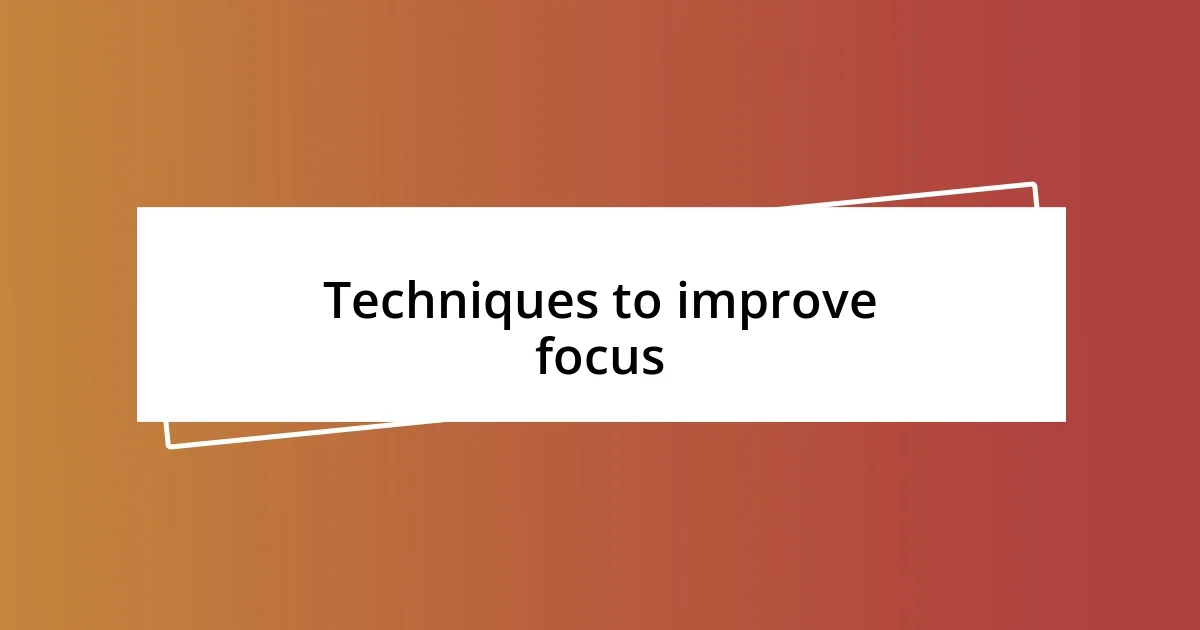
Techniques to improve focus
When it comes to improving focus, one of my go-to techniques is the Pomodoro Technique. This method involves working for a set period, usually 25 minutes, then taking a short break. I remember when I first tried this approach during a particularly hectic week at work; the structured intervals helped me stay on task without feeling overwhelmed. This technique transformed my working style by creating a rhythm that my mind could easily follow.
Another effective technique is practicing mindfulness. Mindfulness meditation trains the brain to focus on the present moment, which can significantly reduce distractions. I once struggled to concentrate in meetings, often letting my mind wander. However, since incorporating mindfulness into my routine, I find it much easier to stay engaged, and this has positively impacted my overall productivity.
Let’s also consider the importance of a well-organized workspace. A clutter-free environment can elevate focus by minimizing visual distractions. During a particularly chaotic project, I took the time to declutter my desk and noticed an immediate boost in my concentration levels. It’s amazing how a clean space can align your mind for more productive work sessions.
| Technique | Description |
|---|---|
| Pomodoro Technique | Work for 25 minutes, take a 5-minute break to stay refreshed and focused. |
| Mindfulness Meditation | Practice being present to help reduce distractions and improve engagement. |
| Organized Workspace | A tidy work environment can enhance focus by limiting visual clutter. |
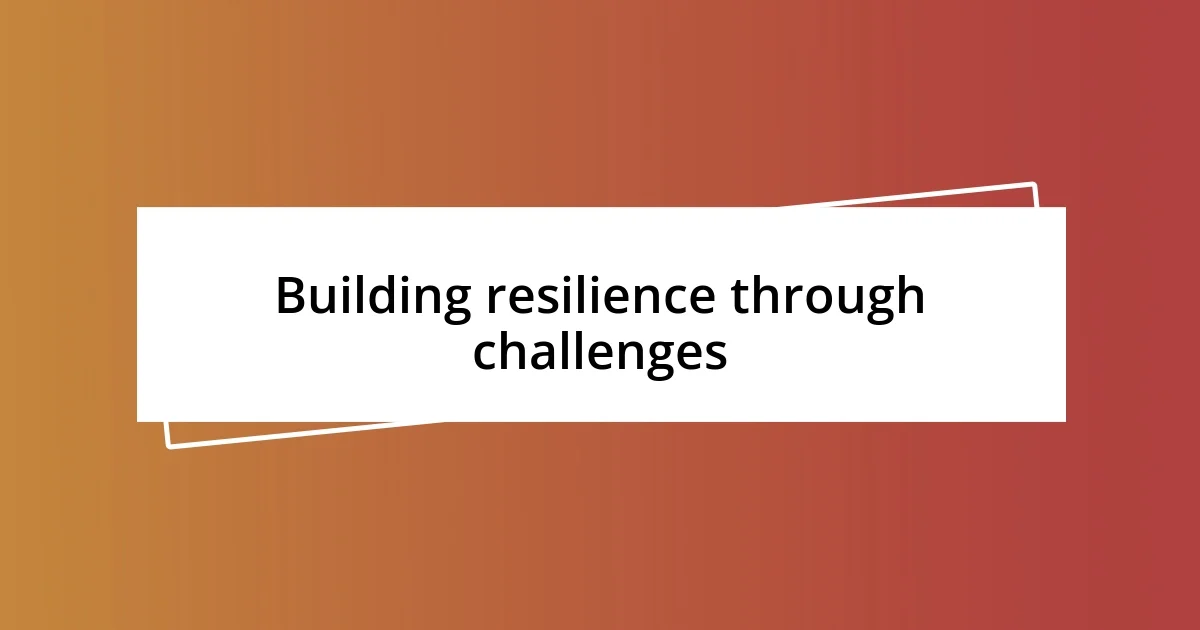
Building resilience through challenges
When faced with challenges, I often remind myself that discomfort is a vital part of the growth process. Just the other day, I tackled a demanding project that required skills I wasn’t entirely confident in. As I navigated through this unfamiliar terrain, I discovered a sense of resilience within me. Isn’t it incredible how challenges can reveal our hidden strengths? Each obstacle I faced became a stepping stone, reinforcing my belief that I can handle more than I initially thought.
I’ve come to appreciate that resilience isn’t just about bouncing back; it’s about thriving in the face of adversity. I recall a particularly intense period when I was juggling multiple responsibilities— work, family, and personal goals. It felt overwhelming at times, but I leaned into those moments. By breaking down tasks into manageable pieces and celebrating small victories, I built a resilience that propelled me forward. I realized that each challenge enriched my emotional toolkit, making me better equipped for the next hurdle.
As I reflect on my experiences, I can’t help but feel grateful for the challenges that have shaped who I am today. Each struggle has been a lesson in patience, perseverance, and self-discovery. Have you noticed how the hardest times often lead to our most significant breakthroughs? For me, embracing the discomfort has not only built my resilience but has also transformed my outlook on failure. Instead of seeing it as an ending, I now view it as a valuable part of the journey toward success.
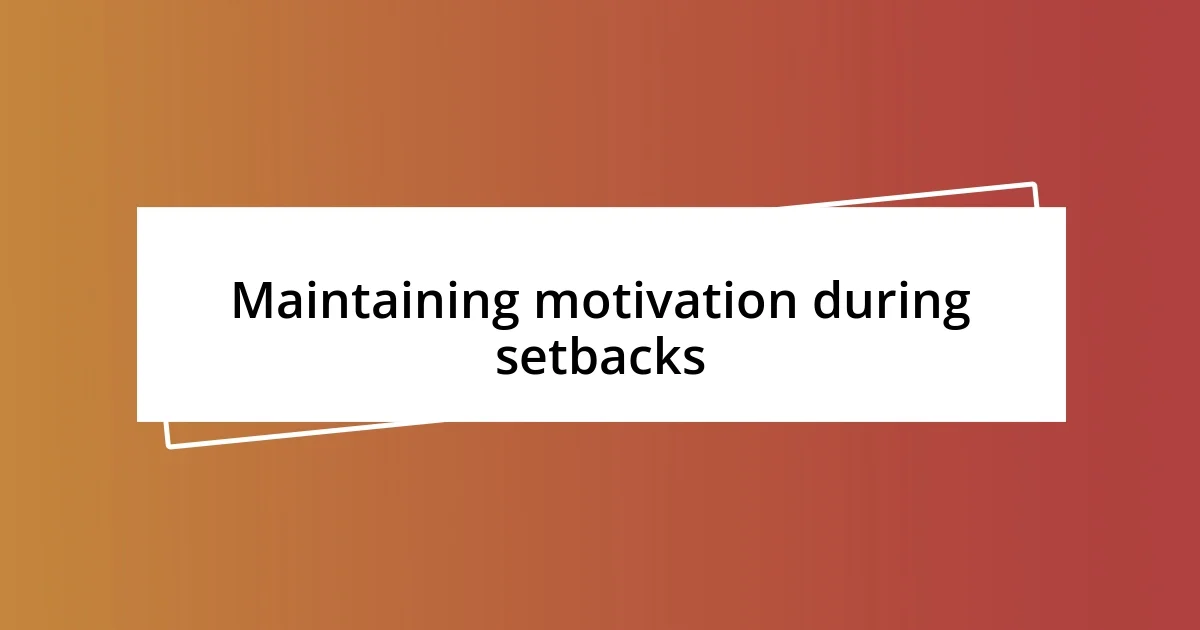
Maintaining motivation during setbacks
I often find that setbacks can be disheartening, nudging me toward thoughts of self-doubt. However, I remind myself of past challenges I’ve overcome. For instance, when I didn’t land a job I was really excited about, I took a moment to reflect rather than spiral into negativity. Instead of dwelling on the rejection, I focused on what I learned from the experience, which fueled my motivation to keep applying and growing.
When I face setbacks, I lean on my support network. Talking to friends who understand my journey can be incredibly motivating. Just last month, after a particularly frustrating week, a casual lunch with a friend turned into a motivational pep talk. Sharing my struggles opened the door to fresh perspectives that lifted my spirits and reignited my drive. Isn’t it fascinating how connection can act as a powerful motivator during tough times?
It’s also crucial to set small, achievable goals during setbacks. I remember feeling overwhelmed after my routine was disrupted due to unexpected changes at work. Rather than focusing on where I had faltered, I gave myself permission to take baby steps. Each small task I completed not only restored a sense of control but also served as a reminder that progress is still possible, even amidst challenges. Have you ever noticed how these tiny wins can make a significant difference in maintaining morale? They remind me that every effort counts on the path to regaining momentum.
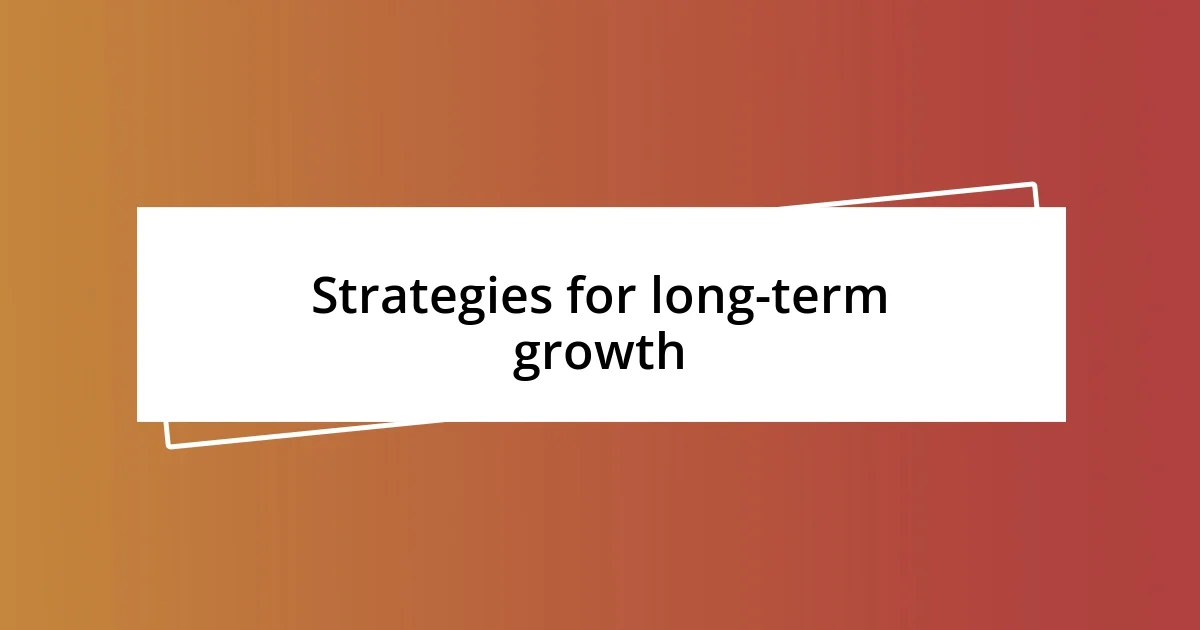
Strategies for long-term growth
I often think about the importance of lifelong learning in my journey to build mental stamina. Recently, I enrolled in an online course that challenged my preconceptions about my abilities. With each lesson, I noticed a surge of excitement and confidence blossoming within me. Isn’t it amazing how stepping outside our comfort zones can fuel growth? By continuously updating my skills and knowledge, I feel more equipped to face future challenges head-on.
Reflecting on my experiences, I deeply value the practice of mindfulness in my long-term growth strategy. During hectic days, I carve out time for meditation—just a few minutes can center me and refocus my mind. There was a day when stress from work was seeping into my personal life. After a short mindfulness session, I felt a wave of clarity wash over me. Have you ever noticed how a brief pause can shift your entire perspective? It certainly helps me embrace challenges with renewed vigor and a clearer mindset.
Another strategy I cherish is creating a strong support system. Just the other day, I had the chance to meet with my mentor, who always inspires me with his insights. During our conversation, I learned that sharing goals and struggles can be incredibly empowering. Connecting with others provides fresh perspectives and reignites passion. How often do we underestimate the power of community on our paths to success? For me, surrounding myself with like-minded individuals propels my growth and keeps me motivated on this journey.
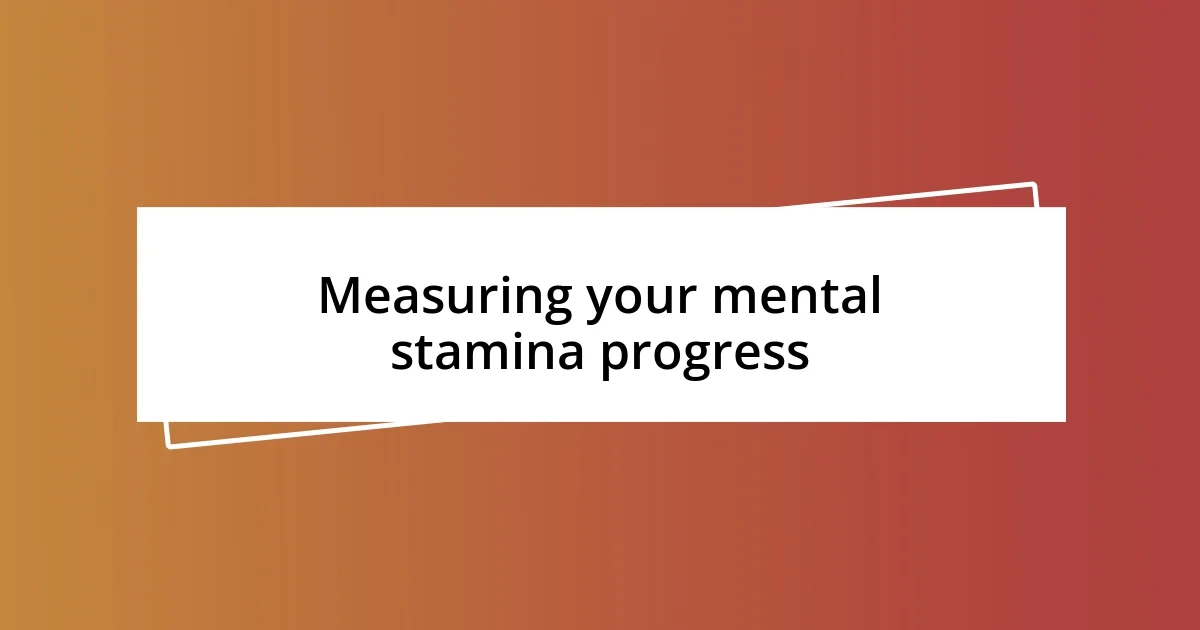
Measuring your mental stamina progress
To effectively measure my mental stamina progress, I’ve found that keeping a journal is invaluable. When I sit down each week to reflect on my thoughts and feelings, I can see how I’ve navigated through challenges. I often ask myself, “What did I handle well? Where did I feel stuck?” This self-analysis reveals patterns over time, offering clarity about the areas where I’ve grown or need more focus.
Tracking my responses to stressful situations has also become a meaningful practice. I recall a particularly intense week when deadlines piled up, and I felt overwhelmed. I documented my emotional responses daily, noting how different strategies helped—or didn’t help. It’s eye-opening to see my resilience develop; I noticed I could recover faster from stressors that used to sideline me for longer. Have you ever tracked something in your life, only to realize how far you’ve come?
Additionally, I love using challenges as benchmarks for my progress. For instance, I took on a public speaking opportunity that terrified me. By comparing my feelings before and after the experience, I recognized not just improvement in my speaking skills but also in my confidence levels. I often wonder: how often do we give ourselves credit for the growth that happens outside our comfort zones? Recognizing these wins reminds me that measuring progress isn’t just about numbers; it’s about the journey and the growth that unfolds along the way.












